人教版七年级下册Unit 4 Don't eat in class.单元复习课件(共35张PPT)
文档属性
| 名称 | 人教版七年级下册Unit 4 Don't eat in class.单元复习课件(共35张PPT) |

|
|
| 格式 | zip | ||
| 文件大小 | 783.8KB | ||
| 资源类型 | 教案 | ||
| 版本资源 | 人教新目标(Go for it)版 | ||
| 科目 | 英语 | ||
| 更新时间 | 2023-04-10 00:00:00 | ||
图片预览

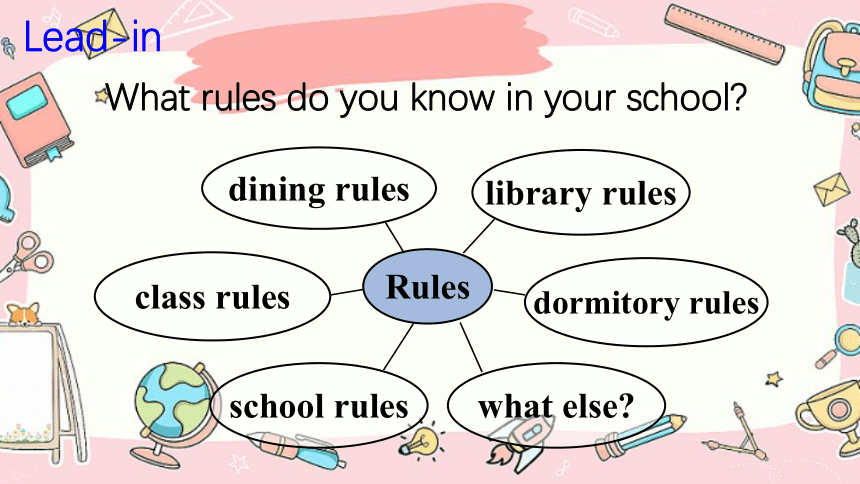
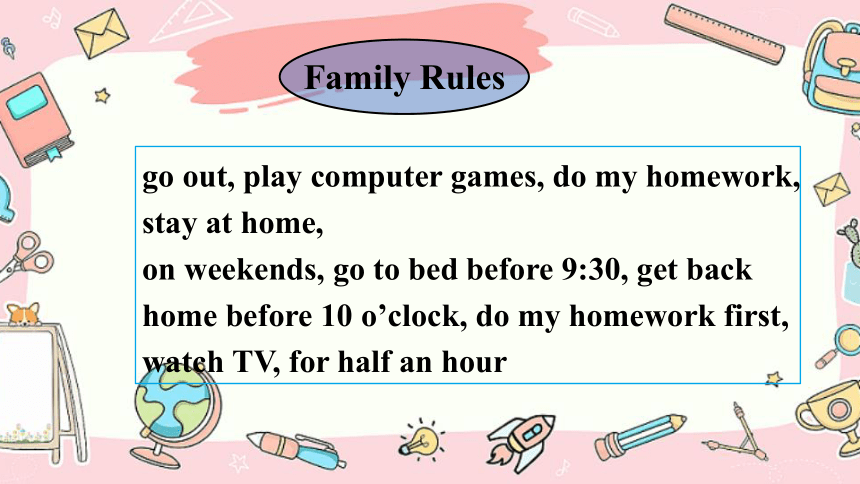
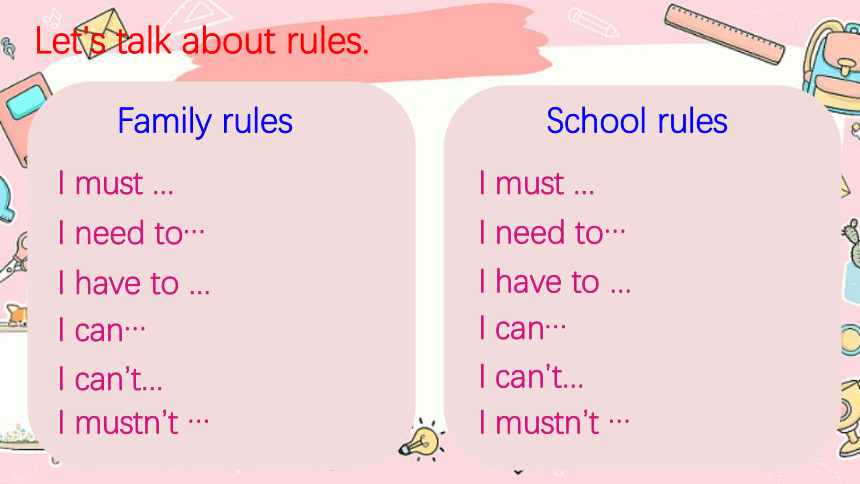

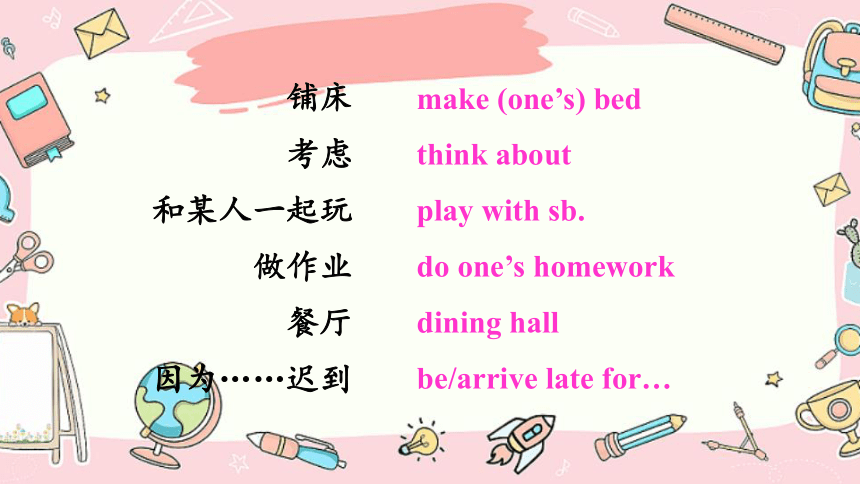
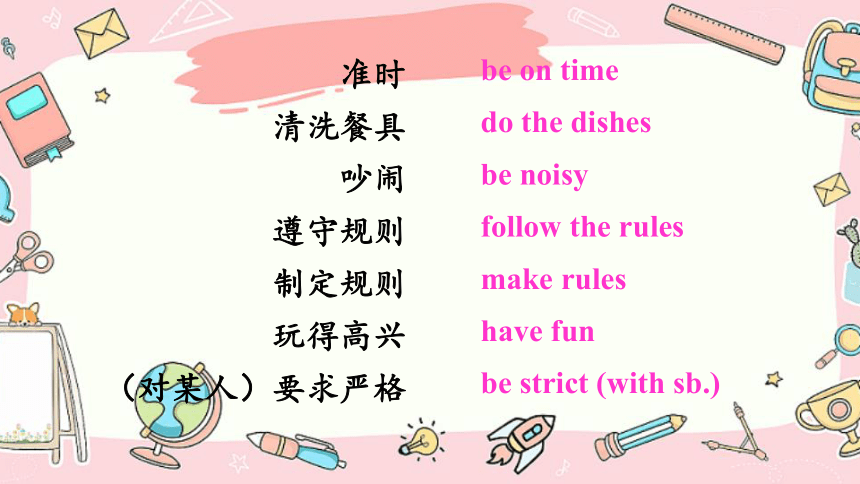
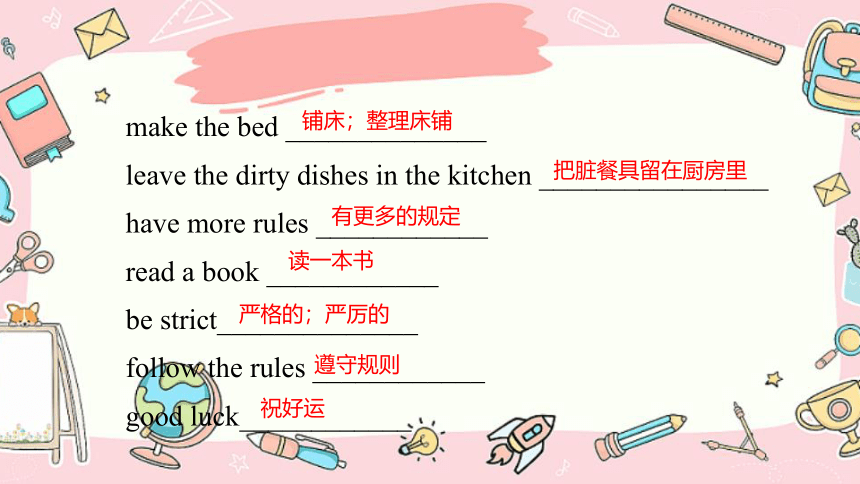

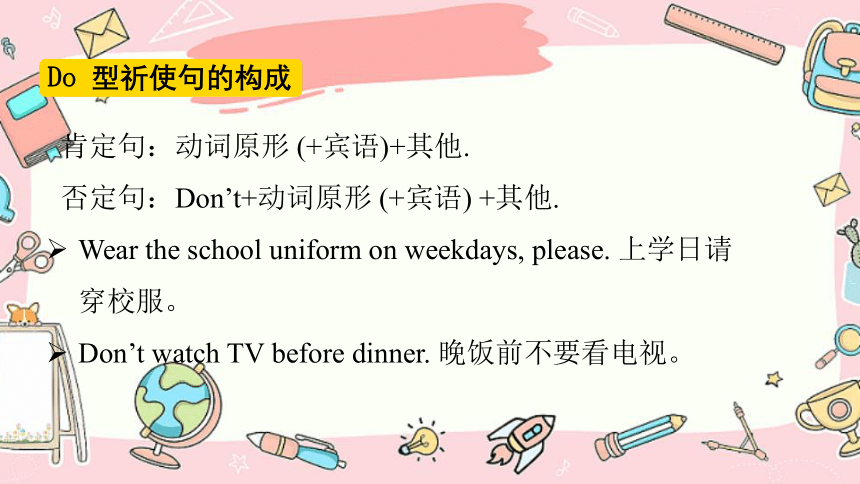

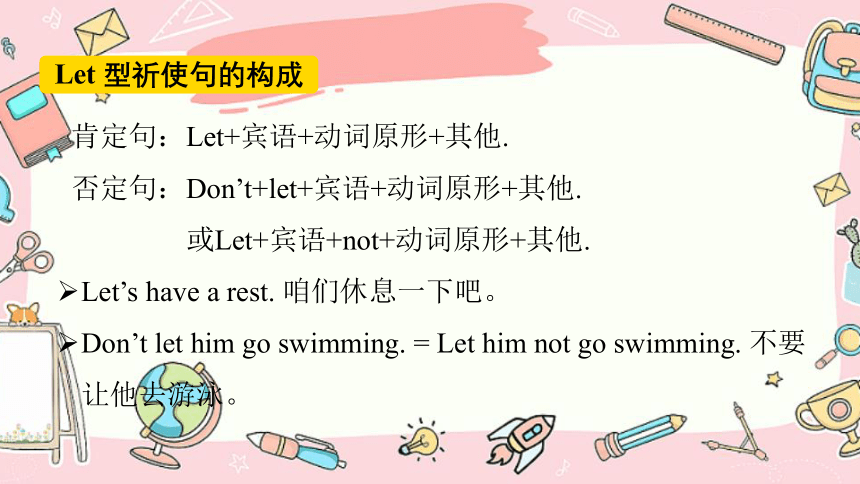
文档简介
(共35张PPT)
Unit 4 Don’t eat in class.
单元复习课件
Rules
dining rules
dormitory rules
library rules
class rules
Lead-in
What rules do you know in your school
school rules
what else
go out, play computer games, do my homework, stay at home,
on weekends, go to bed before 9:30, get back home before 10 o’clock, do my homework first, watch TV, for half an hour
Family Rules
Let’s talk about rules.
Family rules
School rules
I can’t...
I need to…
I have to ...
I can…
I must ...
I mustn’t …
I can’t...
I need to…
I have to ...
I can…
I must ...
I mustn’t …
Review
in class
listen to
have to
go out
be quiet
make breakfast
在课堂上
听
不得不
外出(娱乐)
安静
做早饭
make (one’s) bed
think about
play with sb.
do one’s homework
dining hall
be/arrive late for…
铺床
考虑
和某人一起玩
做作业
餐厅
因为……迟到
准时
清洗餐具
吵闹
遵守规则
制定规则
玩得高兴
(对某人)要求严格
be on time
do the dishes
be noisy
follow the rules
make rules
have fun
be strict (with sb.)
make the bed ______________
leave the dirty dishes in the kitchen ________________
have more rules ____________
read a book ____________
be strict______________
follow the rules ____________
good luck____________
铺床;整理床铺
把脏餐具留在厨房里
有更多的规定
读一本书
严格的;严厉的
遵守规则
祝好运
表示请求、命令、劝说、号召、警告或建议。
主语一般为第二人称you,但通常省略。
为了使祈使句显得更委婉、有礼貌,可在开头或结尾加上please。
祈使句
肯定句:动词原形 (+宾语)+其他.
否定句:Don’t+动词原形 (+宾语) +其他.
Wear the school uniform on weekdays, please. 上学日请穿校服。
Don’t watch TV before dinner. 晚饭前不要看电视。
Do 型祈使句的构成
肯定句:Be+表语+其他.
否定句:Don’t+be+表语 +其他.
Be careful next time.下次要细心。
Don’t be late for school! 上学不要迟到!
Be 型祈使句的构成
肯定句:Let+宾语+动词原形+其他.
否定句:Don’t+let+宾语+动词原形+其他.
或Let+宾语+not+动词原形+其他.
Let’s have a rest. 咱们休息一下吧。
Don’t let him go swimming. = Let him not go swimming. 不要让他去游泳。
Let 型祈使句的构成
其他类型的否定祈使句
(1) No+v-ing! / No+名词!
No fishing! 禁止钓鱼!
No parking! 禁止停车!
No photos! 禁止拍照!
(2) never 代替don’t 来加强语气。
Never give up! 决不放弃!
情态动词have to与must
We must be on time. 我们必须准时。
Does he have to wear a uniform at school 他在学校必须穿校服吗?
He has to live at school because his home is far away from school. 他不得不住校,因为他家离学校很远。
二者均可表示“必须”,其后均接动词原形。
It’s too late. I have to take a taxi. 太晚了,我必须乘出租车。
I must go now. 我必须现在就走。
have to与must的共同点
have to与must的不同点
have to 强调因客观因素影响而不得不做某事,跟主观意愿无关,通常上下文中会有暗示客观因素的句子,多译为“不得不”。
must 表示因主观需要或责任感的驱使而有必要或义务去做某事,多译为“必须”。
have to 可用于不同的时态,有人称和数的变化,其一般现在时的第三人称单数形式为has to;过去式为had to。
must 一般只用来表示现在,没有人称和数的变化。
have to与must的不同点
have to have to的否定形式为don’t/doesn’t /didn’t have to,表示“不必”。
must must的否定形式为mustn’t,表示“禁止,不准”。
have to与must的不同点
He has to leave school because his family is poor.
因为家里穷,他不得不退学。(受客观因素影响)
We must do something about it.
关于这件事我们必须做点什么。(责任感的驱使)
【拓展延伸】以must开头的一般疑问句的肯定回答用must,否定回答用needn’t或don’t have to。
—Must I leave now 我现在必须离开吗?
—Yes, you must./No, you needn’t (don’t have to). 是的,你必须。/不,你不必。
单项选择。
1. ______ with fire. It’s very dangerous.
A. Playing B. Play
C. Don’t play D. Doesn’t play
2.The children _____ play football on the road.
A. can B. must C. mustn’t D. may
3.My sister ______ be at school by seven o’clock.
A. has to B. have to
C. had to D. must to
4. It’s raining all day, so my brother ______ stay at
home.
A. must B. have to C. must to D. has to
5. It’s very warm outside. You ______ wear the coat.
A. have to B. hadn’t to
C. don’t have to D. mustn’t
6.Mary, ______ in bed.
A. not read B. don’t read
C. no reading D. doesn’t read
Molly’s rules
1. She has to get up at six o’clock every morning and make her bed.
2. She can’t leave dirty dishes in the kitchen.
3. She can’t be late for school.
4. She can’t be noisy at school.
5. She can’t eat in class.
7. She has to do her homework first.
8. She can play basketball only on weekends.
9. She has to read a book before she can watch TV.
10. She has to go to bed before 10:00.
6. She can’t play basketball after school.
读课本2b 3分钟,速记内容
Dr. Know’s advice
Advices
can play basketball on weekends
can watch TV after you read a book
make rules to help us
have to follow them
假如你是某国际学校的学生刘洋,在今天的班会上得知交换生 Mary 下周要来你们学校学习,老师请你给她写一封信,向她介绍你们学校的一些规章制度。
练一练
提示:1. 准时到校; 2. 不能打架; 3. ……
要求:1. 条理清晰,语句通顺,语法正确;
2. 词数70左右。
Dear Mary,
How’s it going I’m very glad to hear you are coming to our school.
____________________________________________________________________________________________________________________________________________________________________________________
Yours,
Liu Yang
谋篇布局
开篇点题
介绍规章制度
表达期待
How’s it going
I’m very glad to…
I think you will like our school.
Hope to see you soon.
I want to tell you something about…
You have to… and…
Don’t…
You can’t… but you can…
开头句:
There are too many rules in…
在……里有太多规则。
Let me tell you some rules about…
让我告诉你一些有关……的规则。
开头句:
They make some rules to…
他们制定了一些规章制度来……
Here are rules for…
这些是给……的规则。
中间句:
Don’t… 不要……
We can’t/mustn’t … 我们不能/不准……
I must finish… before… 在……之前我必须完成……
I have to… every… 每个……我必须……
After school, we mustn’t… 放学后,我们不准……
结尾句:
I know these rules are… for me.
我知道这些规则对我……
I think these rules are very…
我认为这些规则是非常……的。
All the rules are important, and I’m sure you can…
所有的规则都很重要,我确信你能……
结尾句:
I have too many rules to follow. I feel terrible. Can you help me
我有太多的规则要遵守。我感觉糟透了。你能帮助我吗?
经典名句:
No rules, no standards. 没有规矩,不成方圆。
Dear Mary,
How’s it going I’m very glad to hear you are coming to our school.
My name is Liu Yang. I want to tell you something about our school rules. You have to wear the school uniform and arrive at school on time from Monday to Friday. You can’t be late for class.
Don’t be noisy in the classroom. You can’t eat in the classroom, but you can eat in the dining hall. Don’t listen to music in the hallways. Don’t fight with others.
Our teachers are strict with us and the school rules are good for us. I think you will like our school. Hope to see you soon.
Yours,
Liu Yang
Unit 4 Don’t eat in class.
单元复习课件
Rules
dining rules
dormitory rules
library rules
class rules
Lead-in
What rules do you know in your school
school rules
what else
go out, play computer games, do my homework, stay at home,
on weekends, go to bed before 9:30, get back home before 10 o’clock, do my homework first, watch TV, for half an hour
Family Rules
Let’s talk about rules.
Family rules
School rules
I can’t...
I need to…
I have to ...
I can…
I must ...
I mustn’t …
I can’t...
I need to…
I have to ...
I can…
I must ...
I mustn’t …
Review
in class
listen to
have to
go out
be quiet
make breakfast
在课堂上
听
不得不
外出(娱乐)
安静
做早饭
make (one’s) bed
think about
play with sb.
do one’s homework
dining hall
be/arrive late for…
铺床
考虑
和某人一起玩
做作业
餐厅
因为……迟到
准时
清洗餐具
吵闹
遵守规则
制定规则
玩得高兴
(对某人)要求严格
be on time
do the dishes
be noisy
follow the rules
make rules
have fun
be strict (with sb.)
make the bed ______________
leave the dirty dishes in the kitchen ________________
have more rules ____________
read a book ____________
be strict______________
follow the rules ____________
good luck____________
铺床;整理床铺
把脏餐具留在厨房里
有更多的规定
读一本书
严格的;严厉的
遵守规则
祝好运
表示请求、命令、劝说、号召、警告或建议。
主语一般为第二人称you,但通常省略。
为了使祈使句显得更委婉、有礼貌,可在开头或结尾加上please。
祈使句
肯定句:动词原形 (+宾语)+其他.
否定句:Don’t+动词原形 (+宾语) +其他.
Wear the school uniform on weekdays, please. 上学日请穿校服。
Don’t watch TV before dinner. 晚饭前不要看电视。
Do 型祈使句的构成
肯定句:Be+表语+其他.
否定句:Don’t+be+表语 +其他.
Be careful next time.下次要细心。
Don’t be late for school! 上学不要迟到!
Be 型祈使句的构成
肯定句:Let+宾语+动词原形+其他.
否定句:Don’t+let+宾语+动词原形+其他.
或Let+宾语+not+动词原形+其他.
Let’s have a rest. 咱们休息一下吧。
Don’t let him go swimming. = Let him not go swimming. 不要让他去游泳。
Let 型祈使句的构成
其他类型的否定祈使句
(1) No+v-ing! / No+名词!
No fishing! 禁止钓鱼!
No parking! 禁止停车!
No photos! 禁止拍照!
(2) never 代替don’t 来加强语气。
Never give up! 决不放弃!
情态动词have to与must
We must be on time. 我们必须准时。
Does he have to wear a uniform at school 他在学校必须穿校服吗?
He has to live at school because his home is far away from school. 他不得不住校,因为他家离学校很远。
二者均可表示“必须”,其后均接动词原形。
It’s too late. I have to take a taxi. 太晚了,我必须乘出租车。
I must go now. 我必须现在就走。
have to与must的共同点
have to与must的不同点
have to 强调因客观因素影响而不得不做某事,跟主观意愿无关,通常上下文中会有暗示客观因素的句子,多译为“不得不”。
must 表示因主观需要或责任感的驱使而有必要或义务去做某事,多译为“必须”。
have to 可用于不同的时态,有人称和数的变化,其一般现在时的第三人称单数形式为has to;过去式为had to。
must 一般只用来表示现在,没有人称和数的变化。
have to与must的不同点
have to have to的否定形式为don’t/doesn’t /didn’t have to,表示“不必”。
must must的否定形式为mustn’t,表示“禁止,不准”。
have to与must的不同点
He has to leave school because his family is poor.
因为家里穷,他不得不退学。(受客观因素影响)
We must do something about it.
关于这件事我们必须做点什么。(责任感的驱使)
【拓展延伸】以must开头的一般疑问句的肯定回答用must,否定回答用needn’t或don’t have to。
—Must I leave now 我现在必须离开吗?
—Yes, you must./No, you needn’t (don’t have to). 是的,你必须。/不,你不必。
单项选择。
1. ______ with fire. It’s very dangerous.
A. Playing B. Play
C. Don’t play D. Doesn’t play
2.The children _____ play football on the road.
A. can B. must C. mustn’t D. may
3.My sister ______ be at school by seven o’clock.
A. has to B. have to
C. had to D. must to
4. It’s raining all day, so my brother ______ stay at
home.
A. must B. have to C. must to D. has to
5. It’s very warm outside. You ______ wear the coat.
A. have to B. hadn’t to
C. don’t have to D. mustn’t
6.Mary, ______ in bed.
A. not read B. don’t read
C. no reading D. doesn’t read
Molly’s rules
1. She has to get up at six o’clock every morning and make her bed.
2. She can’t leave dirty dishes in the kitchen.
3. She can’t be late for school.
4. She can’t be noisy at school.
5. She can’t eat in class.
7. She has to do her homework first.
8. She can play basketball only on weekends.
9. She has to read a book before she can watch TV.
10. She has to go to bed before 10:00.
6. She can’t play basketball after school.
读课本2b 3分钟,速记内容
Dr. Know’s advice
Advices
can play basketball on weekends
can watch TV after you read a book
make rules to help us
have to follow them
假如你是某国际学校的学生刘洋,在今天的班会上得知交换生 Mary 下周要来你们学校学习,老师请你给她写一封信,向她介绍你们学校的一些规章制度。
练一练
提示:1. 准时到校; 2. 不能打架; 3. ……
要求:1. 条理清晰,语句通顺,语法正确;
2. 词数70左右。
Dear Mary,
How’s it going I’m very glad to hear you are coming to our school.
____________________________________________________________________________________________________________________________________________________________________________________
Yours,
Liu Yang
谋篇布局
开篇点题
介绍规章制度
表达期待
How’s it going
I’m very glad to…
I think you will like our school.
Hope to see you soon.
I want to tell you something about…
You have to… and…
Don’t…
You can’t… but you can…
开头句:
There are too many rules in…
在……里有太多规则。
Let me tell you some rules about…
让我告诉你一些有关……的规则。
开头句:
They make some rules to…
他们制定了一些规章制度来……
Here are rules for…
这些是给……的规则。
中间句:
Don’t… 不要……
We can’t/mustn’t … 我们不能/不准……
I must finish… before… 在……之前我必须完成……
I have to… every… 每个……我必须……
After school, we mustn’t… 放学后,我们不准……
结尾句:
I know these rules are… for me.
我知道这些规则对我……
I think these rules are very…
我认为这些规则是非常……的。
All the rules are important, and I’m sure you can…
所有的规则都很重要,我确信你能……
结尾句:
I have too many rules to follow. I feel terrible. Can you help me
我有太多的规则要遵守。我感觉糟透了。你能帮助我吗?
经典名句:
No rules, no standards. 没有规矩,不成方圆。
Dear Mary,
How’s it going I’m very glad to hear you are coming to our school.
My name is Liu Yang. I want to tell you something about our school rules. You have to wear the school uniform and arrive at school on time from Monday to Friday. You can’t be late for class.
Don’t be noisy in the classroom. You can’t eat in the classroom, but you can eat in the dining hall. Don’t listen to music in the hallways. Don’t fight with others.
Our teachers are strict with us and the school rules are good for us. I think you will like our school. Hope to see you soon.
Yours,
Liu Yang
同课章节目录
- Unit 1 Can you play the guitar?
- Section A
- Section B
- Unit 2 What time do you go to school?
- Section A
- Section B
- Unit 3 How do you get to school?
- Section A
- Section B
- Unit 4 Don't eat in class.
- Section A
- Section B
- Unit 5 Why do you like pandas?
- Section A
- Section B
- Unit 6 I'm watching TV.
- Section A
- Section B
- Review of Units 1-6
- Unit 7 It's raining!
- Section A
- Section B
- Unit 8 Is there a post office near here?
- Section A
- Section B
- Unit 9 What does he look like?
- Section A
- Section B
- Unit 10 I'd like some noodles.
- Section A
- Section B
- Unit 11 How was your school trip?
- Section A
- Section B
- Unit 12 What did you do last weekend?
- Section A
- Section B
